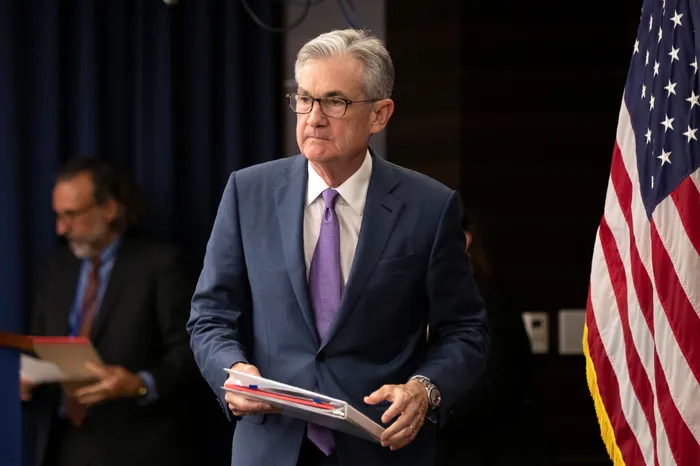Equity markets struggle due to interest rate and inflation fears

The market is watching for direction from the Federal Reserve Chairman Jerome Powell's Federal Open Market Committee. File
Equity prices across the board struggled last week after just as bad contraction the previous week. Fears of an interest rate hike in the US, as well as the geopolitical situation in the Middle East, have led to risk aversion away from equities.
Any positive sentiment that the US Federal Reserve will take a dovish stance at their meeting this Tuesday and Wednesday on interest rates was blown out of the window after the release of the US Private Consumption Expenditure (PCE) last Thursday.
The core (PCE) price index, which excludes food and energy prices, and is one of the three core key variables of inflation the Fed uses, increased by 0.3% in September (month-on-month). This is the highest increase in four months and much higher than the 0.1% gain in August. Including volatile food and energy prices, the PCE index increased 0.4%. The other two main variables – namely hourly wages, which increased by 4.6% in September, and the increase in producer prices from 2.0% in August to 2.2% in September – turned market sentiment on US and global markets negative in anticipation of yet another at least 25 basis points hike in the Feds’s bank rate on Wednesday.
The All Share Index on the JSE broke downwards easily through the 70 000 point level and closed Friday on 69 706. This is 2.83% lower than the previous weeks close and already 10.65% down for the past three months and 4.3% in the red since the beginning of the year.
The resources sector suffered the most as the Res10 lost 5.0% last week and now trades 20.8% down since the beginning of the year.
The sell-off of shares on the JSE just echoed the negative sentiment on global markets. In the US, the S&P 500 last week traded down by 1.9%, whereas Dow Jones Industrial shares lost 1.8% and the Nasdaq decreased by 2.0%. In Europe the Euro Stox 600 index traded down by 1.2% during last week, The UK FTSE 100 was down by 1.4%. In China, the Hang Seng Index gained 1.1%.
The rand exchange rate improved marginally last week against major currencies. Against the US dollar, the rand gained six cents, to R18.84 against R18.90 the previous Friday. The Brent oil price remains under $90 (R1703) and traded Friday on R89.30 per barrel. Given the relatively stronger rand and a much lower average oil price during October, it is expected the Central Energy Fund will this week announce a sharp drop in the petrol price of around 200 cents a litre, and for diesel a drop of around 104 cents a litre.
This coming week, local markets will await the government’s Medium-Term Budget Policy Statement, to be delivered on Wednesday. The main questions that analysts and investors are seeking answers to are what the government’s income, expenditure, deficit and debt levels were over the past six months. Also, the economic forecast of the Treasury, as well as any changes in policy to address the current high levels of debt.
On global markets, analysts and economists await the press conference by the Fed’s chairperson, Jerome Powell, on Wednesday. He will then announce the interest rate decision of the Fed’s Federal Open Market Commission (FOMC) after their meeting that starts on Tuesday. The market expects the FOMC will keep its bank rate at 5.5%. Most advanced economies will release various purchases managers indices over the week.

Chris Harmse is the consulting economist of Sequoia Capital Management.
BUSINESS REPORT
Related Topics: